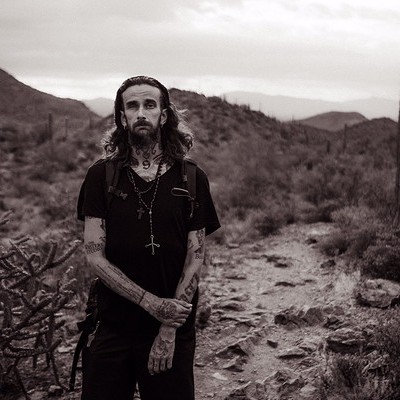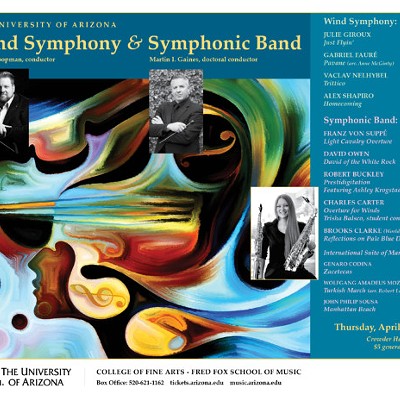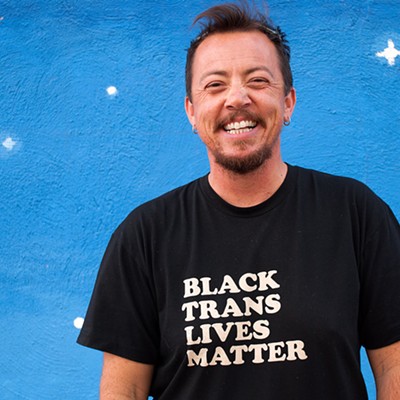Which is what POG does. Launched in 1997 as a loose collective intent on discussing poetics, POG holds as one of its main principles that to do so you have to incorporate forms of expression not normally defined by poetics--things you do with clay and musical notes and body movements, for example. They call it cross-genre communication. They also have an anthology (POGONE) and T-shirts -- which help lend clout to any organization.
Some see POG as a progressive-thinking response to the so-called "poetry mill" of academia, and some view POG as a meeting pool for poetry seekers from throughout Tucson's robust arts community. Either way, POG challenges the usual notions of poetry and the usual ways it is presented, discussed and appreciated. Its four-year "Poetry in Action" series has brought together wordworkers, visual and performance artists, musicians, dancers and nearly all other conceivable Technicians of the Sacred (to borrow 1998 POG guest Jerome Rothenberg's great title) in an ongoing public exploration of the art of words.
POG dips equally into the collective talent of the academy and the street, staging events in geographically diverse settings, and using everything from computer presentations to ceramics demonstrations in the hope of making language something large enough for us to live in.
This untraditional tradition continues Saturday when POG pairs poet/translator Cole Swensen and dancer/choreographer Eno Washington. Swensen, the director of the University of Denver's creative writing program, is known for her excellent translations from French, and her work in English has netted several major awards, including the National Poetry Series and the New American Poetry Series Award from Sun & Moon Press.
Her most recent collection, Try, won the Iowa Poetry Prize and the (San Francisco) Poetry Center & American Poetry Archives Book Award. The world Swensen creates in Try is one where life and art not only describe each other, but seem to initiate a conversation that becomes trance-like and transformative; her work is visually exacting, bringing to mind Simone Weil's insistence that true attentiveness has the power of the miraculous.
Washington, who resides in our own little pueblo, is a specialist in Pan-African dance. He's a Fulbright scholar, author, teacher and performer, and his work is dedicated to illuminating the connections between African dance and the dances of the African diaspora. Washington was featured in the 1992 Cinema Guild film Dance on the Wind: Memoirs of a Mississippi Shaman, a seminal work in transcontinental dance you'll find in most major research libraries.
So POG along to the Orts studio Saturday, and also mark your datebook with the next POGing opportunity on December 16, when American Indian writer Diane Glancy and painter/computer artist Ted Pope meet at Dinnerware Gallery.
To POG or not to POG is the question, and should you feel the urge for a literary adventure, here's my recipe for a well-rounded literary weekend. It may restore the faith in language you lost during the recent elections. Friday at 11 a.m. and 8 p.m., Robert Hass reads at St. Philips in the Hills Church for the UA Poetry Center's 40th anniversary (see City Week, page 21, for details). Then Saturday at 7 p.m. POG at Orts Theatre of Dance, 121 E. Seventh St. Admission is $5 and $3. Sunday at 1 p.m. is Singing Winds Bookshop's Thanksgiving Fiesta. See City Week, page 20, for details.
And for the most adventurous, please note the week's other fine literary offerings for such lovelies as the Reader's Oasis/UA Press celebration and the Make a Date with a Poet series.










